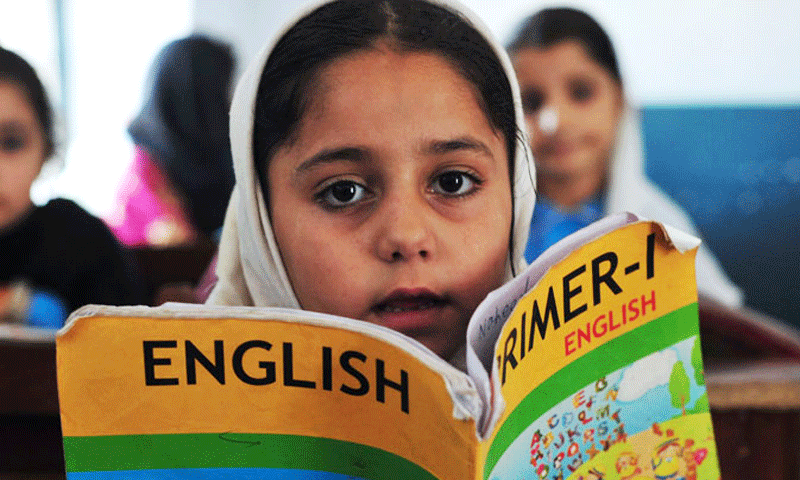It is not just inertia and coercion that work in favour of English. It is also, these days, popular demand. English is the language of technology. In Africa and South Asia, most higher education is in English, so those who aspire to a college education must master the language. “In higher studies, like medicine and engineering, English is a must,” says Atul Kumar Srivastava, president of the Association of Private Schools of Uttar Pradesh, and headmaster of St Basil’s School, Lucknow.
而支持英語的不僅是慣性和脅迫。還有如今廣泛的需求。英語是科技語言。在非洲和南亞,大部分高等教育都使用英語教學。因此,那些渴望接受大學教育的人必須掌握這門語言。“在高等教育中,諸如醫(yī)藥和工程這樣的專業(yè),英語是必不可少的。” 北方邦私立學校協(xié)會主席兼勒克瑙圣巴茲爾學校校長阿圖爾·庫馬爾·斯利瓦斯塔瓦如此表示。
English-medium education is no longer the preserve of the elite. Sameena Asif, whose husband is a street hawker, sends her three children to private school in Lahore, Pakistan. “They won’t get a degree or a job if they can’t speak English. I have a BA in Urdu, but it’s useless. I’m embarrassed that I was educated in Urdu.”
用英語教學不再是精英的特權。薩姆妮娜·阿西夫的丈夫是一名街頭小販,他們將三個孩子送到巴基斯坦拉合爾的私立學校。“如果他們不會說英語,就得不到學位或工作。我有烏爾都語的文學學士學位,但沒有用。我很尷尬,因為我接受的是烏爾都語教育。”
Many state governments in India, like that in Uttar Pradesh, are establishing or expanding English-medium education. All primary schools are English-medium in Jammu & Kashmir; Andhra Pradesh announced last year that its elementary schools would convert to English; others are experimenting on a smaller scale. In Pakistan, the Punjab provincial government announced in 2009 that it would go English-medium, and Khyber Pakhtunkhwa announced the same in 2013.
印度的許多邦政府,如北方邦,正在建立或擴大以英語為媒介的教育。查謨和克什米爾所有小學都是用英語教學;安得拉邦去年宣布,其小學將改為用英語教學;其他地區(qū)則在進行小規(guī)模的試驗。在巴基斯坦,2009年,旁遮普省政府宣布將采用英語教學,2013年,開伯爾-普赫圖赫瓦省也宣布了同樣的做法。
The medium clouds the message
媒介使信息混亂
Yet there are problems associated with much English-medium schooling. Visitors soon discover that, except in elite establishments, interviews in most “English-medium” schools have to be conducted through an interpreter, in the local language, because neither teachers nor pupils speak much English. At the Lucknow primary school, the head teacher and two out of four teachers speak reasonably good English, but the other two little. Since most of the pupils’ parents are illiterate, they are unlikely to be aware of that.
然而,許多英語媒介教學也存在一些問題。參觀者很快就發(fā)現(xiàn),除了精英機構,在大部分英語媒介學校,面試者不得不通過精通當?shù)卣Z言的口譯員進行,因為學校原來的教師和學生都不很精通英語。在勒克瑙小學,校長及四名教師中的兩名都很精通英語,但另兩名教師則很少講英語。因為大部分小學生的家長是文盲,所以也沒人意識到這一點。

Such difficulties are reflected in the findings of much research into the educational outcomes of English-medium schooling. The most-often cited study into private versus government-school outcomes in India, carried out in Andhra Pradesh in 2013, found that on average pupils in private schools performed a bit better than those in government schools. But pupils in Telugu-speaking private schools did considerably better in maths than those in English-medium schools.
對用英語教學的學校教育進行了諸多研究,結果表明這樣的教學方式存在此類困難。2013年,在安得拉邦關于印度私立學校和公立學校成果的研究表明私立學校的學生平均成績比公立學校的學生稍好,后這項研究被引用得最多。但在講泰魯古語的私立學校,學生的數(shù)學成績要比在英語媒介學校好得多。
History provides some intriguing examples of the effect of being educated in the mother tongue or some other language. A policy change in South Africa introduced in 1955 by the apartheid government used the medium of education to sharpen the divide between whites and blacks, increasing the years of schooling that children got in their mother tongue. Two extra years of mother-tongue schooling, instead of schooling in Afrikaans or English, raised both literacy and wages, according to a recent study of historical data.
歷史上一些有趣的例子表明用母語及其他語言教學的影響。1955年,支持種族隔離制的政府在南非引入一項政策變革,正是通過教育媒介加劇白人和黑人的差距、增加孩子們用母語接受教育的時間。最近對歷史數(shù)據(jù)的研究表明,額外多出的兩年母語(而非南非荷蘭語或英語)教學時間,提高了識字率和工資水平。
譯文由可可原創(chuàng),僅供學習交流使用,未經(jīng)許可請勿轉(zhuǎn)載。












